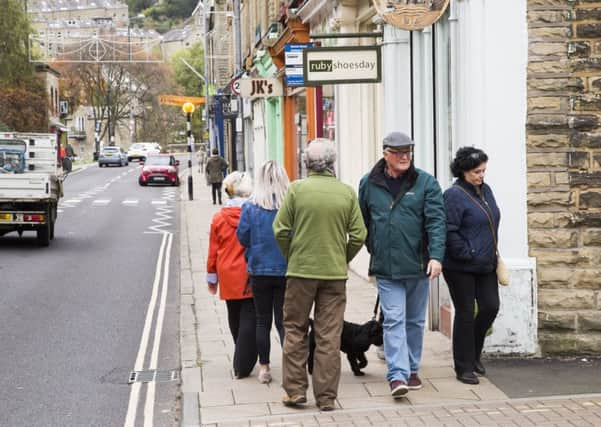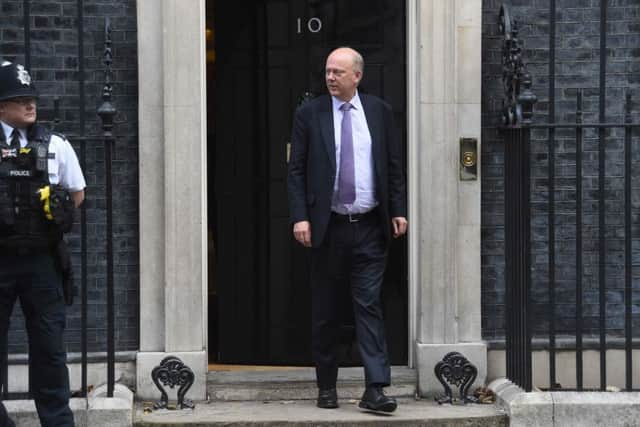Tom Richmond: It'll take more than £1.5bn and policy tweaks to save our high streets


Yet, while a range of contributors from retail guru Kate Hardcastle to Shadow Business Secretary Rebecca Long Bailey accepted, no response has still been forthcoming from a Minister.
Advertisement
Hide AdAdvertisement
Hide AdCalls to the Treasury were, in turn, referred to the Department of Business, Energy & Industrial Strategy who then directed this correspondent to the Department of Housing, Planning and Local Government.


With me so far? The latter then put this newspaper in touch with an external PR company handling publicity for the Great British High Street Awards 2018. Still no piece has arrived.
Advertisement
Hide AdAdvertisement
Hide AdI can only assume that it is because the Government has no coherent policy since business rates were tweaked five years ago – and councils urged to introduce more shopper-friendly parking policies.
After all, the current rating system is unjust when a florist is paying more per metre than the nearby Marks & Spencer store, which also sells flowers, because her work space, where she puts bouquets and arrangements together, is also classed as a high-end shop.
Advertisement
Hide AdAdvertisement
Hide AdWhen she took it up with her local MP, she says she got nowhere – and he just happened to be David Cameron when he was Prime Minister. No wonder so many high streets are struggling to survive, never mind thrive, when this is the best that the Tories, the supposed party of small business, can do.
With Jake Berry, the designated High Street Minister, virtually silent on this issue, not least because he’s also in charge of Northern Powerhouse policy, it’s more important than ever that Chancellor Philip Hammond uses the Budget on Monday to look at the issue.
A £1.5bn package is being prepared, including cuts to business rates, but policy tweaks and wheezes only go so far.
As well as looking at the feasibility of imposing an Amazon levy on online purchases and deliveries – no wonder the roads are so congested – Mr Hammond should also be taking on board the proposals put forward by former John Lewis boss Andy Street who is now mayor of the West Midlands.
Advertisement
Hide AdAdvertisement
Hide Ad“We should think, therefore, about how we can accommodate affordable residential property alongside retail to encourage a revival around our high streets. This could mean repurposing surplus business premises to provide quality urban housing,” he recommends.
He also calls for redundant shops to be turned into sustainable co-working spaces where new companies can be based. “Our start-up hot beds are too often focused on bespoke office space in higher rent areas – why not drive this dynamo into every town centre?” he adds.
“Shops will still populate the high street of tomorrow, but they will be different to the outlets of today; specialist retailers, mixed-use spaces, local shops and some new concepts we don’t even know about yet. Traditional business must learn to evolve quickly, to disrupt the disruptors, and give high streets new relevance.”
The aptly-named Mr Street is right. If people work and live in town centres, as many of the younger generation now desire, high streets can have a future. However it requires a joined-up plan across the Government rather than the prevailing bargain basement approach. For, the longer buildings being vacated by Debenhams and many others are left empty, the greater the rot that will set in.
Advertisement
Hide AdAdvertisement
Hide AdJARED O’Mara has done himself few favours as the Sheffield Hallam MP, not least his offensive language and poor voting record that does not compare favourably with the dutiful attendance of others. But he did speak from personal experience in this week’s Parliamentary debate on autism about the difficulties facing sufferers like himself.
He also revealed that he’s only been to Prime Minister’s Questions once since June 2017 because – by his own admission – he can’t cope with the “shouting when everyone is heckling, the aggression and the loud noises”. He won’t be alone.
WHEN he appeared before the Transport Select Committee to explain why one of his officials suggested in an email that details of compensation scheme for passengers at the height of the timetable chaos should not be circulated to the media, Chris Grayling replied: “I don’t know.” It’s the same answer I have to give when I’m asked – more frequently than some services actually operate – why the Transport Secretary, who says he doesn’t run the trains, is still in his job.
AT the same hearing, Chris Grayling was forced to concede that most announcements at stations “are automated and don’t provide info the public need”. He conceded there was a lack of proactive information and he was going to meet industry bosses to look at this. Good – but the Transport Secretary is late again. It should have happened long before this year’s timetable chaos.
Advertisement
Hide AdAdvertisement
Hide AdTO be fair, Chris Grayling has now agreed to meet commuters from Slaithwaite and Marsden on the trans-Pennine line. Previously highlighted in these columns, trains due to stop at these stations invariably do not do so because the timetable on the key route between Leeds and Manchester is a work of fiction. I’ll be even more impressed if the Transport Secretary acts on this scandal.
A VERY conciliatory cross-party debate on a rare form of paediatric cancer prompted Dame Eleanor Laing, the Deputy Speaker, to thank participants “for showing what this House of Commons can do when it treats a sad but important subject in a serious, hopeful and positive way” before noting that “too many people see us as just arguing for the sake of it”. Hear, hear.